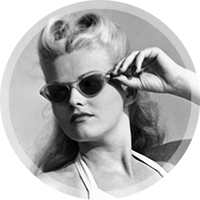

In the summer I turned thirty-six, I drove Route 57 south from Chicago to southern Illinois for the second time. There is a little house down there, tucked in a curve of a country road, with a yard and garden and a large side porch strung with lights that glow in the darkness.
I found the house on Airbnb. It was built in 1856 and recently repurposed from a permanent residence to revolving door retreat, where visitors came to get away from noise and people and distraction. There is a wood stove and books on meditation and a bird feeder where cardinal couples come to peck. There is no television or internet or reliable cell phone reception. I like it.
The route I drive to get there from the city is an approximation of one created more than a century ago, when cars were a new invention that needed a marketing campaign to get folks’ attention. In Illinois, you had the overgrown frontier town of Chicago that hulked in the north at the edge of Lake Michigan, and then, to the south, in the corner where the Ohio River met the Mississippi, you had the small city of Cairo, stranded in a lowland delta area called Little Egypt. So it only made sense that to get to the former to the latter you would drive down the Egyptian Trail.
The Egyptian Trail was a big deal when it was conjured up in 1915. It shone with the magic of the road trip, a concept that hadn’t even been mythologized yet, but people responded to it anyway. Little Illinois towns, with a sudden fear of isolation that hadn’t existed before, clamored to have the Trail swing near them, to bring travelers into their realm, and, of course, to more easily become travelers themselves. There was suddenly a frontier again, and you could go there.
Route 57 is not the original Egyptian Trail, but it might as well be. When you catch it off of the South Side of Chicago and begin following the path it lays out, you are told by bright reflective signs that you’re headed towards Cairo, and beyond it Memphis. The names from old civilizations, recycled for new lands. Despite the exoticism of the names, it’s not an interesting drive. Most of Illinois is pancake flat, swept with cornfields and the odd range of wind turbines lazily turning their arms through the air. The road is modernized for convenience, which means they have sanded off any unique edges that stick out, and one gas station plaza by the side of the highway looks much like every other. I suspect, though, it has never been a road for looking. It has always been there just to move.
The second time I traveled to my retreat, I already knew that part of the retreat is the traveling. As fond as I am of the little homestead, the traveling there might even be the most important part. The open sky, the unimpeded path. The room to think. There isn’t much to do but think if you’re driving by yourself, and I always am. I think about the people who followed the trail before me, for all that hundred years for all their hundreds of reasons, their own direction and their own restlessness and their own thoughts. Included among them is the person I was last year when I last drove down the highway.
What it comes down to is that you can follow the same trail you’ve been down before, but each time you do, it’s different. And if you want to get anything out of the trip, you had better learn to figure out what makes it the same and what makes it different. Where the common ground is, and where the fresh frontier lies. Or you might never make it back.
The Egyptian Trail went the other way, too, naturally. Once it had been routed and paved, if you were in one of those Illinois cornfields you could then get a ride north, straight up for six hours until you saw the skyline of Chicago etched on the horizon. It’s now the way I drive home, back to the noise and the people and the distraction, where we layer our stories on top of one another until we build up the structures that sustain us, because now, as always, we need all the connection that we can get and we’ll keep moving until we find it.